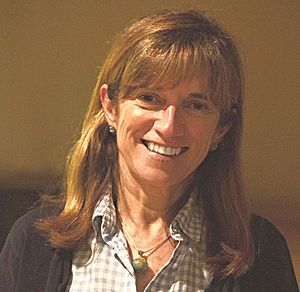Anna Traveset facts for kids
Anna Traveset is a Spanish ecologist who studies how plants and animals interact with each other. She is especially famous for her work on islands.
Dr. Traveset is a top researcher at the Mediterranean Institute for Advanced Studies (IMEDEA). This institute is located in Mallorca, Spain. She also works as a professor at the University of the Balearic Islands.
She has received several important awards for her environmental work. In 2017, she won the Rey Jaime I Award for Environmental Protection. In 2022, she received the Ramon Llull Award from the Balearic Government. From 2019 to 2024, she was the main representative for the CSIC in the Balearic Islands.
Contents
Her Journey in Science
Early Education and Research
Anna Traveset studied Biology at the University of Barcelona. For her Master's degree, she studied freshwater sponges. She then earned her PhD at the University of Pennsylvania in the USA.
During her PhD, she started studying how plants and animals interact. She did fieldwork in Guanacaste National Park in Costa Rica. After her PhD, she worked at the Doñana Biological Station in Spain. In 1992, she moved to IMEDEA in Mallorca.
Professional Roles and Leadership
Dr. Traveset joined the Spanish National Research Council (CSIC) in 1995. She became a Research Professor in 2006. Since 2000, she has led the Terrestrial Ecology laboratory at IMEDEA.
She has also been part of many important international science groups. For example, she was a Spanish representative for a European Science Foundation program. She also served on the committee for Advanced Research Grants of the European Research Council.
What Anna Traveset Studies
Focus on Island Ecosystems
Dr. Traveset's main research looks at how plants and animals interact on islands. Her work also helps us understand ecosystems on continents. She has led projects in many different island groups. These include the Canary Islands, Galapagos, and Seychelles. These islands are very important because they have a lot of different kinds of plants and animals.
Plant-Animal Interactions
Her most important discoveries are about how plants are pollinated and how seeds are spread. Pollination is when pollen moves from one flower to another, helping plants make seeds. Seed dispersal is how seeds move away from the parent plant, often with the help of animals.
She also studies how plants and herbivores (animals that eat plants) interact. Her goal is to understand how these interactions keep ecosystems healthy.
Understanding Global Change
Dr. Traveset uses a special method called "network theory." This helps her see how global changes affect natural communities. These changes include new species arriving (biological invasions), losing natural homes (habitat loss), and changes in weather patterns (climate change).
She works with scientists from over 30 countries. She has published about 300 papers and book chapters. She also co-edited a book called Plant Invasions: The Role of Biotic Interactions.
Important Research Projects
Dr. Traveset leads or participates in many exciting research projects. Here are some of them:
- IslandLife: This project studies how complex island ecosystems are changing.
- DEPICT: This project looks at how island ecosystems respond to different problems.
- LIFE 4 POLLINATORS: This project involves people in protecting wild bees and other pollinators in the Mediterranean area.
- FUNgreen: This project studies how different natural areas are connected.
Awards and Recognition
Anna Traveset has received many honors for her important work:
- 2024: Premi Leandre Cervera, for her career in science.
- 2023: Distinción Luis Balaguer, from the Spanish Association of Terrestrial Ecology.
- 2023: Premio Medalla Margarita Salas del CSIC, for guiding students in their research.
- 2022: Premi Ramon Llull, from the Balearic Government.
- 2022: European Research Council’s Advanced Grant, a very important research grant.
- 2017: King James I Award for Environmental Conservation. This is one of the most respected science awards in Spain.
- 1996: Bartomeu Darder Award, for the best study in natural sciences in the Balearic Islands.
Selected Publications
Dr. Traveset has written many scientific papers. Here are a few examples of her work:
- Martins, L.,… Traveset, A., … & Tylianakis, J.M. (2022) This paper looked at how bird-fruit interactions change across the world.
- Colom, P.; Ninyerola, M.; Pons, X.; Traveset, A. & Stefanescu S. (2022) This study explored how climate change affects Mediterranean butterflies.
- González-Varo J.P., Rumeu, JB., Albrecht, J., Arroyo, J.M., Bueno, R.S., Burgos, T., da Silva, L.P., Escribano-Ávila, G., Farwig, N., García, D., Heleno, R.H:, Illera, J.C., Jordano, P., Kurek, P., Simmons, B.I., Virgós, E., Sutherland, W.J., and Traveset, A. (2021) This research showed how bird migration affects how plants spread their seeds.
- Heleno, R.H., Ripple, W. J. & Traveset, A. (2020) This paper warned about the danger to food webs, which are like food chains in an ecosystem.
- Traveset, A., Tur C. & Eguíluz, V.M. (2017) This study looked at how important pollinators are for plants to survive.
- Traveset, A. et al. (2015) This paper explored how pollination networks work in the Galápagos Islands.
- Traveset, A. & Richardson, D.M. (2014) This research discussed how new species arriving can disrupt how plants and animals help each other.
- Traveset, A. (1998) This paper reviewed how seeds germinate after passing through the guts of fruit-eating animals.
You can find a full list of her publications online.
See also
 In Spanish: Anna Traveset para niños
In Spanish: Anna Traveset para niños
 | Delilah Pierce |
 | Gordon Parks |
 | Augusta Savage |
 | Charles Ethan Porter |


